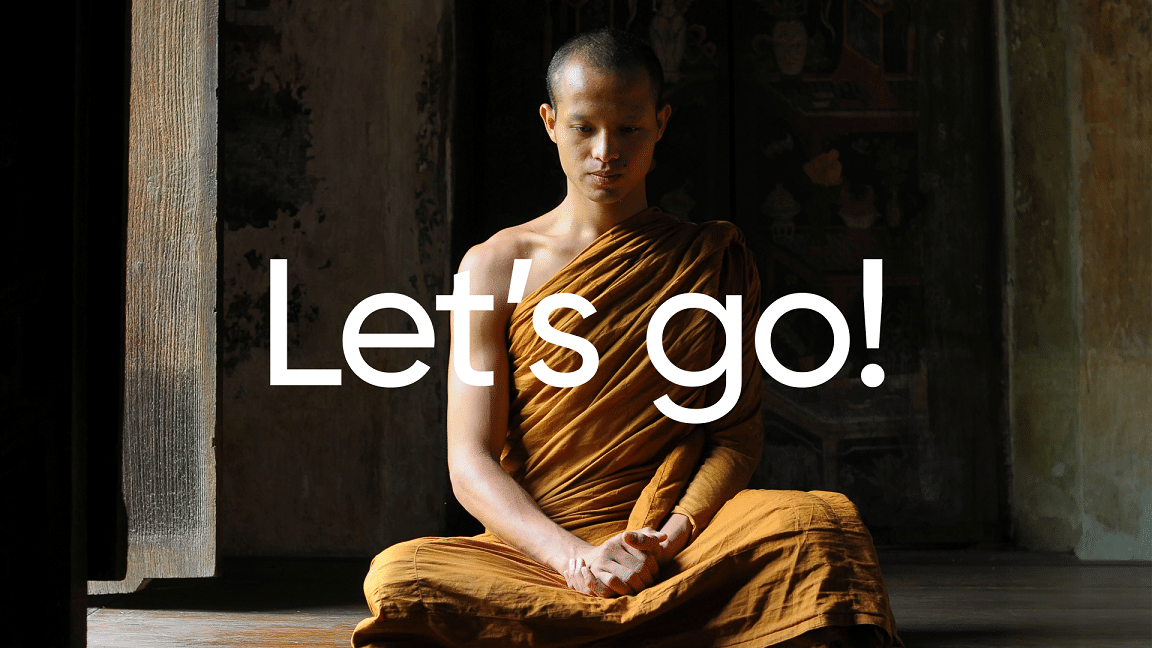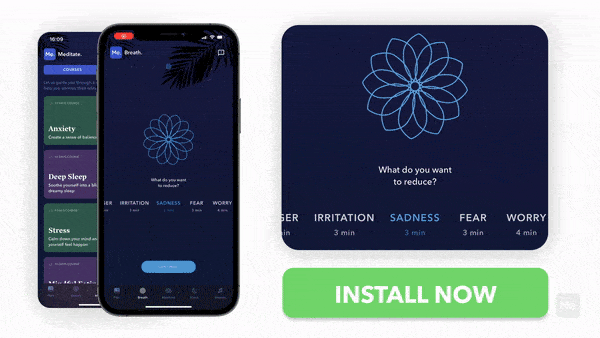Things are only important in our lives if they can do what they are said to do. A car is only good if it can take you from point A to point B; a diet is only good if it can achieve what it says it can achieve. The same applies to meditation, which is a practice that is gaining popularity across the world due to what is said it can do. The question to ask is, “Does meditation work?”
What Is Meditation?
Different people have tried to describe meditation according to what it achieved and felt for them. Meditation is said to be a formal exercise that people use to cultivate compassion and awareness. It is a mind and body practice that is used to improve calmness, physical relaxation, and psychological balance. It also helps deal with some conditions and improves overall well-being. Meditation involves focusing your attention to achieve this calmness and clarity. Most people who are for it do it daily, as we all need something that reminds us to return to the moment, and that is what meditation does by helping us achieve awareness.
Over the past few years, there has been an increase in the number of mental conditions all over the world. This is becoming very common among many young people. Meditation is known to help deal with stress, anxiety, depression, addiction, and chronic pain. Before you can start experiencing the benefits of meditation, you need to do it as regularly as you possibly can. Meditation is not a magic trick; it does not work instantly. Its benefits could start to show weeks or even months into the practice. The main aim of meditation is to promote overall mental health to both people with mental health conditions and people who are okay, and it does this by promoting a calm and stable mind. One could easily say meditation is the brain’s exercise. It helps us understand who we are and how we function.
Read More: Mantra Meditation: Empowering Words That’ll Put You Into A Better Headspace
Meditation And Different Cultures
Meditation is not a new thing; it has been practiced all over the world for many years. Different cultures and religions use meditation for different reasons and in different ways. Meditation was particularly popular in Asia first, and this is due to Buddhism. With gaining global fame, it started being used to treat stress, depression, anxiety, and other mental conditions.
There are a few things, apart from benefits, that have made meditation spread faster than hot gossip. One of which is the fact that anyone can meditate, as it is not limited to a certain culture, religion, age, gender, or even race. The fact that meditation is quite simple and very cheap is also an advantage. It is cheap because it does not require any equipment. One can also meditate anyway they want to, be it at work, school, or restaurant, as long as it is a quiet place since this is one of the few requirements it has.
In other words, meditation is a set of techniques that are intended to encourage a heightened state of awareness and focus, aiming to help us learn how to return and remain in the moment.
With stress being a constant presence in our lives, taking time to process emotions, decompress and get into the right frame of mind is absolutely crucial. With BetterMe: Meditation & Sleep app your mental health is in good hands! Start using it now!
Does Meditation Work? Why Meditation Might Not Work For You?
The only way to know if meditation really works is to look at what it can do and benefit someone. People are still in doubt about this practice, and just like everything else in this world, it can’t be everyone’s cup of tea.
There are certain reasons as to why meditation may not work for you; here are some of those reasons:
-
People Often Judge Themselves
Most people who end up not experiencing the benefits of meditation are because they keep judging themselves and are always dubious. They are always wondering if they are doing it correctly and effectively. As long as you have that doubt, it is so easy to get discouraged and might make you stop the practice even before you can bear witness to its numerous benefits.
While it is easy to get in doubt, when you are meditating, you should try to ignore those doubts and try as much as possible to concentrate on the present. Clear your mind of all the thoughts and concentrate on your breathing. Remember, the point of meditation is to create a safe space for yourself in your mind that is free from judgment and doubt. If you are doubting yourself, you should know there is no right and wrong way of meditating. Meditation is a shoe that fits different people differently, and hence if you can stay aware, focus on your breathing, and be in the moment, you are good to go.
-
People Meditate When They Are Tired Or Sleepy
The time you meditate also has an impact on whether meditation will work for you or not. If you meditate when you are tired or sleepy, you are less likely to experience the benefits of this act. Meditating just right after you wake up or meditating after work can cause problems. Just after waking up, you are still sleepy. Mostly, when we are in a somber state, our minds think we want to sleep and end up feeling sleepy. The atmosphere one creates during meditation is the same atmosphere one creates just before they fall asleep. If you meditate at the end of the day, you are likely to be tired from the day’s activities, and hence it is very easy for you to get sleepy. Meditating when it’s scorching can also be challenging as increased heat comes with falling asleep easily.
It would be best if you tried to meditate when you are fully awake and active. If you usually work out, meditating just after a workout session might be beneficial. Meditating just after taking a shower might also be a good time to do so. Look for times when you are most active and incorporate your meditation schedule into those times.
-
People Are Not Consistent
Just as mentioned earlier, for you to enjoy the sweet fruits of meditation, you have to do it as often as possible. One needs to meditate at least every single day. You can only know what meditation can do if you do it. Consistency is very important. While planning for your day’s activities, make sure to leave yourself some time to meditate.
-
People Meditate Alone
Although most people might want to meditate alone, it is advisable to meditate with people. When you meditate alone, it is so easy to stray away, make excuses not to do it, cut your meditation time short, sleep, and so on; the list is endless. Doing it with people makes it easier to avoid most of these things. First of all, people help to keep you accountable. “Hey, are we still going to our meditation call today?” Receiving such a text will make you commit to going even if you had no plans of doing so.
It is hard to fall asleep when you are around people. No one wants to embarrass themselves, as falling asleep in front of people can be embarrassing. What if you drool? Nobody wants to have to live through that shame. It is also hard to cut your meditation time since it is a planned thing. If the session is supposed to take an hour, it will take an hour. Finally, meditating with people is fun. You end up making friends, and people can engage in social activities like grabbing something to eat after the meditation sessions. If something is fun, it becomes sustainable.
-
People Meditate To Escape
People try to use meditation as an escape, and this should not be the case. Remember, for it to be effective, you need to be active and aware; using meditation as an escape means you are using it to forget things, and this is not being aware. Meditation is supposed to make one aware and make them inclined to more conscious decisions in the future. It is supposed to help you deal with yourself and with the people around you in the best possible manner. Using it as an escape is limiting what it is designed to achieve.
Read More: Dark Meditation: Cultivating A Sense Of Light In A Pitch Black Room
-
People Underestimate Meditation
Most people think meditation is very easy. People will probably say that it is just as simple as sitting down, closing your eyes, and breathing. It is not as easy as it sounds. Every single minute there are so many thoughts that are running wild in our minds. It is very hard to keep those thoughts in control, especially when you are new to the practice. It is very easy to start overthinking and creating fake scenarios in your mind. The worst thing about these distractions is their element of surprise. How do you prepare for overthinking? You don’t know what and how you’ll start to wonder.
It would be best if you got into meditation with the mindset of it being hard yet not impossible. Know distractions will come and what matters is how you handle them. Even people who have been meditating for such a long period do get distracted, but they can easily deal with the distractions since they have been doing it for a long time. Also, if meditating was that easy, everyone would be doing it.
-
People Expect A Spiritual Experience From Meditation
This is due to its long association with Buddhism. People get into meditation, expecting what it doesn’t offer. Just because you meditate doesn’t mean you have everything figured out. It doesn’t mean you are not anxious about your interview or stressed about your rent. Meditation does not solve your problems, but it makes you more aware, increases your ability to filter things in your mind, and helps you understand what matters, which is the present. People try to complicate meditation by making it more than it is. Meditation is basically a practice that frees up your mind and should be thought of as that.
Those are some of the reasons why you might not be experiencing the mighty works of meditation.
Does Meditation Really Work?
Here, we shall look at different ways in which meditation works to better our lives.
Something tells us you often forget to put all the everyday hustle and bustle on hold and simply concentrate on yourself. It’s time to straighten out your priorities! Take a moment to heal, process your emotions, ground yourself, release all the pent-up tension and recharge with the BetterMe: Meditation & Sleep app before getting back into the race of life!
Does Meditation Work For Weight Loss?
Can meditation help you lose those extra pounds? Yes, it does. Meditation is known to help one lose weight in many different ways.
First, it is said to help promote weight loss by helping one create a healthy relationship with food. Meditation encourages us to enjoy food by helping us eat when we are hungry and not when we are stressed or feeling overwhelmed. It does this by helping people deal with stress. There are many reasons why most people are stressed; work, school, relationships, and finances can all be stressful. Meditation helps us deal with stress, which in turn prevents us from stress or emotional eating. Emotional eating is where people tend to eat and overeat due to certain strong emotions and feelings. Here you are not eating because you are hungry, but you are eating to use food as a coping mechanism to a strong feeling or emotion. Stress eating is known to cause weight gain if not dealt with.
Apart from helping people deal with stress eating, it also helps people to be mindful of what they eat. It encourages people to enjoy the food by smelling it, appreciating how it tastes, and noting how it makes our bodies feel. Being mindful about what we eat helps us listen to our bodies and know when to eat and when to stop. It helps stop emotional eating, which we now know can easily lead to weight gain.
Does Meditation Work? Another Way Meditation Helps One To Lose Weight
Another way meditation helps people to lose weight is by enabling them to sustain the weight loss that they undergo. We all know that sometimes keeping the weight off is harder than actually losing it. A study that was conducted showed that mindfulness-based interventions for weight loss were effective not only in promoting weight loss but also in keeping the weight away compared to the normal weight-loss interventions. Mindfulness-based interventions for weight loss promote sustainable weight loss because, in the process of shedding weight, they also help change one’s thinking about food and healthy living patterns. It helps people be aware of the lifestyle decisions they make, hence promoting sustainable weight loss.
Meditation is also said to promote good sleeping patterns. Good quality sleep is on the list of things people must do to lose weight. When you have good sleeping patterns, it reduces the chances of night snacking, which is also a culprit for weight gain just like stress-eating. Meditation does this by teaching you how to handle stress; hence you don’t stay up at night worried, and this prevents your chances for snacking at night.
Those are some of the ways meditation helps one lose weight.
Does Meditation Work To Anxiety?
Meditation is said to reduce anxiety, stress, and improve overall mental health. Different studies have been done to try and prove if this is really the case. The studies have determined that meditation is effective when it comes to improving stress-related outcomes such as anxiety, depression, stress/distress, positive mood, mental health-related quality of life, attention, substance use, eating habits, sleep, pain, and weight.
A study that was done to prove this showed improved anxiety levels and depression levels only 8 weeks into the study (2). Meditation does not necessarily help you figure out what is stressing you out, but it makes you more prepared to deal with stress since you have more ways to bounce back from it. This is important as stress will always be there but knowing how to deal with it is where the catch is. Most people don’t know how to handle stress, which is why they end up developing stress and anxiety-related disorders.
It is important to remember that meditation should not be used in place of any other practices or medication prescribed by a doctor or an expert (1). Even though meditation is effective when it comes to dealing with stress, a doctor will always know what is best for you. Instead of replacing your medicine with meditation, you can add meditation into the mix for even better results. Before you do this, make sure to consult a doctor or any other expert.
How Long Does Meditation Take To Work?
This is something that is usually a bother, especially among people who are new to meditation. They usually want to know how long it will take before they can experience the benefits of this practice. When you realize that meditation is a life term commitment, issues like how long it is going to take before it becomes effective will become irrelevant. At first, meditation will likely look more of a task than something you anticipate doing. With time, you will start looking forward to your daily meditation once you see what it will do for you. Instead of worrying about how much time it will take before it works, look at how to be consistent. Don’t miss any sessions, and you will truly see it working sooner rather than later.
The Bottom Line
Does meditation work? Yes, it does. This practice is effective in promoting weight loss and improved mental health. This shows that meditation does work in improving our physical and emotional health. For it to be effective, you need consistency with the practice. Meditation has other benefits like help improve our relationships with people, increase our attention span, and even prevent memory loss. Meditation is a practice that can develop our total well-being, and hence it comes highly recommended.
DISCLAIMER:
This article is intended for general informational purposes only and does not address individual circumstances. It is not a substitute for professional advice or help and should not be relied on to make decisions of any kind. A licensed physician should be consulted for diagnosis and treatment of any medical conditions. Any action you take upon the information presented in this article is strictly at your own risk and responsibility!
SOURCES:
- Meditation: In Depth (2016, nccih.nih.gov)
- Meditation programs for psychological stress and well-being: a systematic review and meta-analysis (2013, ncbi.nlm.nih.gov)

















